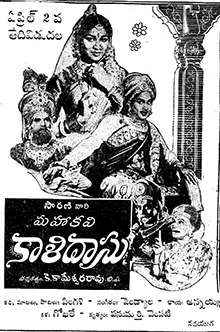Plot
The film begins in the Avanti kingdom; its King has a daughter, Vidyadhari, an ardent devotee of Goddess Mahakali. Once, a soothsayer predicted she would be the leading woman for a great history. Being cognizant of it, the King decides to espouse his daughter with a glorious poet when Mahamantri Hariharamathyudu expresses his desire to knit the princess with his idiotic son, but the King scorns him. Enraged Mahamantri ploys by forging a disabled Kaaludu as a great scholar and performing the nuptial. Soon after, Vidyadhari realized the truth and lamented before the goddess. Kaaludu makes an immense penance, and Kaali accords him a boon of new Knowledge. Immediately, Kaaludu transforms into a scholar, Kalidasu, but forgets his past and quits. Distressed, Vidyadhari stands up with courage and proceeds to search for him. Right now, Kalidasu earns various kudos for his works and reaches Kaasi, where he clarifies a stanza and states it is from Ramayana written by Hanuman. Listening to it, self-proclaimed poet Rakshasa heckles before King Bhoja Raja when Hanuman appears and affirms Kalidasa as a great poet. Witnessing it, Bhoja Raja himself moves to pursue his whereabouts of him. The two meet at a peepal tree where a demon waits for their conjoining and bestows them an idol of Sarada Devi, which they install in Bharatacharya's ashram.
Here, Bhoja Raja endorses a great acclamation for Kalidasu, which irks Kavi Rakshasa and ruses to defame him. Simultaneously, learning about her husband, Vidyadhari lands at Kaasi, where she spots his closeness with court dancer Vilasavati. Humiliated Vidyadhari attempts suicide when Bharatacharya rescues and shelters her. Currently, she starts serving Kalidasu, who calls her Uma and loves her. However, detecting her as married, he goes into depression. During that time, Bhoja Raja asks him for scripture, an epic on feelings out of separation, when Kalidasu composes a beautiful love story, Meghasandesam. Then, Kavi Rakshasa challenges him to write the same but fails, so he steals Kalidasa's book. Bhoja Raja understands the reality of Kavi Rakshana being penalized by withdrawing his laureates. After that, Bhoja Raja requests Kalidasu to pen the story of Shakuntala, but he hesitates as the characters lack standards. Later, with the inspiration of Vidyadhari, he completes a world-class epic Abhijñānaśākuntalam. Hence, Bhoja Raja decides to accolade Kalidasu with half of his kingdom. At that juncture, Bhattacharya gazes at the relationship between Kalidasu & Vidyadhari, so he invites the King of Avanti to the event, where he professes Kalidasu as his son-in-law, to which he refuses. During that plight, Vidyadhari implores the deity who retrieves Kalidasa's memory. Finally, the movie ends happily with the couple's reunion.
This page is based on this
Wikipedia article Text is available under the
CC BY-SA 4.0 license; additional terms may apply.
Images, videos and audio are available under their respective licenses.
